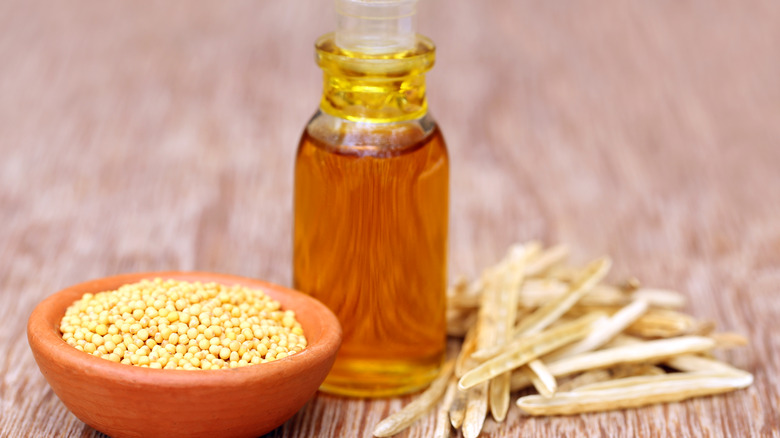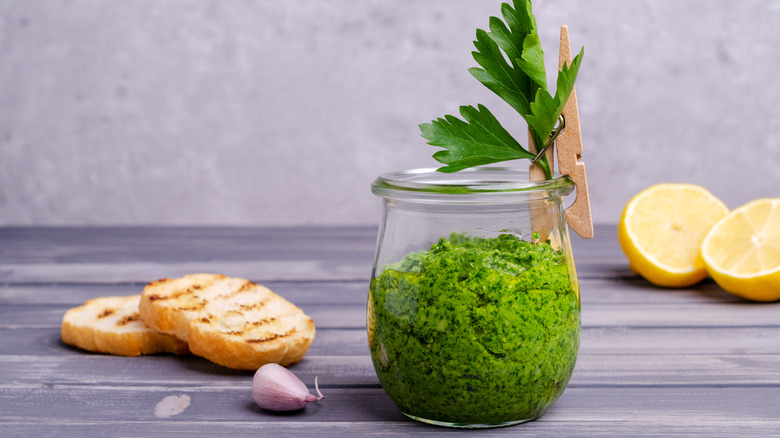Is Mustard Oil Actually Hazardous To Your Health?
We may receive a commission on purchases made from links.
Mustard oil is widely used in China, India, Pakistan, and other Asian countries, offering both flavor and nutrition. With its spicy flavor, it can make a delicious addition to okra dishes, pickles, salads, or tandoori chicken. Indian chef Hari Ghotra says it's a perfect match for Ragan Josh, Bengali fish curry, and fish kebab. Moreover, this condiment is rich in mono- and polyunsaturated fats, including omega-3s, according to the U.S. Department of Agriculture.
As you might have guessed, the oil comes from mustard seeds. Depending on its origins, it can be produced from Brassica nigra or Brassica juncea, notes Boston University's Metropolitan College (MET). Because it has a high smoke point, it's suitable for deep frying, baking, and grilling. But despite these aspects, mustard oil has been banned in the U.S. for more than three decades. The reason is that it contains high levels of erucic acid, a potentially harmful compound, explains MET.
However, experts are divided when it comes to the potential benefits and risks of mustard oil. As MET notes, some studies suggest that erucic acid affects cardiovascular health, but the research is conflicting. Plus, most evidence comes from animal studies, making it difficult to draw a conclusion.
The controversy behind mustard oil
In the U.S., mustard oil is allowed for external use only, despite its high nutritional value. One tablespoon provides 124 calories and 14 grams of fat, including more than half of the recommended daily amount of omega-3s (per MyFoodData). The problem is that it also contains 20% to 40% erucic acid, a monounsaturated fatty acid, reports the U.S. Food and Drug Administration (FDA). In animal studies, this compound has been shown to cause cardiac lesions and fat buildup in the heart muscle, according to MET.
A study published in the Journal of Clinical and Diagnostic Research in 2016 found that people who consume mustard oil are more likely to develop heart disease than those eating ghee, or clarified butter. As the researchers note, erucic acid may cancel out some of the benefits of linoleic acid, a heart-healthy fat in mustard oil. However, the study was relatively small and drew data from a survey, so its findings may not be accurate. Plus, it says nothing about the participants' overall diet, exercise habits, or other factors influencing cardiovascular health.
In another study published in the American Journal of Clinical Nutrition in 2004, individuals who consumed mustard oil had a lower risk of heart disease than those consuming sunflower oil. Moreover, mustard oil is rich in glucosinolates and other phytonutrients that may protect against cancer, improve digestion, and slow aging, suggests a 2019 review featured in the Asian Journal of Dairy and Food Research.
Alternatives to mustard oil
The research on mustard oil is mixed. The FDA advises against using this condiment for cooking unless you opt for essential mustard oil, a version with much lower levels of erucic acid. To date, Yandilla's Spicy Mustard Seed Oil is the only food-grade mustard seed oil approved by the FDA, according to Feast. This product comes from Australia and can be used for high-heat cooking. Its nutritional value is similar to that of traditional mustard oil.
You can also try to recreate the taste and flavor of mustard oil by mixing different ingredients, such as vegetable oil and dry mustard, as suggested by GourmetSleuth. Alternatively, you may use wasabi oil or sauce for a spicy kick.
Another option is to mix olive oil, rice bran oil, or other kitchen oils with mustard paste, horseradish, ginger, or ground mustard seeds, depending on what you want to cook. Caraway seeds have a similar flavor to mustard seeds, and you can sprinkle them over food or mix them with vegetable oils.


